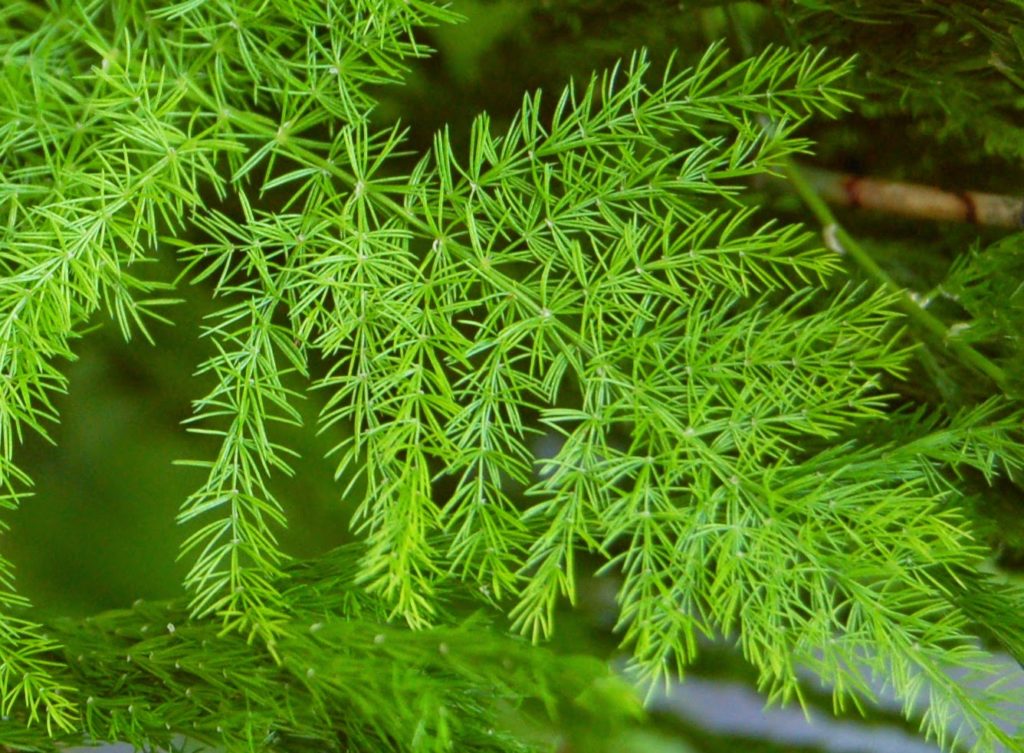
Making this herb a part of your diet, helps in digestion, as it has anti-ulcer properties, while it also aids in strengthening the immune system.
The herb has also been found to have anxiety-reducing, antidepressant, and aphrodisiac properties.
There are lots of other herbs with similar and more effective properties than the asparagus racemosus, but it is still considered as one of the best Ayurvedic medicine. It is also commonly known by the name Shatavari, which translates into “she possesses 100 husbands”.
The plant is commonly found in subtropical and tropical forests, and has been used for years in Homeopathy, Unani, and Ayurveda for treating different diseases.
What are the medicinal uses of asparagus racemosus?
Asparagus racemosus is known to have very powerful anti-inflammatory, antiseptic and anti-oxidant qualities, which is why it is considered as one of the best herbs in Ayurveda medicine.
Steroidal saponins, and polyclyclic asparoid are commonly drawn from the dry root, while it also has purine. Therefore consuming it in excess is considered very harmful. It does contain some very useful medicinal values, which include the following:
- Washing external wounds
- Treating gastrointestinal disorders
- Treating bronchitis
- Cures infertility in women
- Treating chronic fever
- Treating stomach ulcer
- Treating diarrhea, and hyperacidity
- Improves concentration
- Treating impotence and debility
- Enhances libido naturally
- Increases milk production in nourishing mothers
- Strengthens immune system
- Protects brain neurons
- Treating insomnia, nervousness and slow growth of children
- Treating gonorrhea, and piles
- Improves metabolism in the body
With so many great medicinal uses and benefits offered by asparagus racemosus, it is no surprise to learn that it is one of the most popular Ayurvedic herb used in medicine today.
What are the health benefits of asparagus racemosus?
Asparagus racemosus also offers tons of health benefits, which has allowed people to take advantage of its beneficial medicinal qualities. Some of the major health benefits it offers are:
Asparagus racemosus is very rich in vitamin K, which stops blood clotting. There are numerous studies have linked vitamin K to improving bone health and density. The outcome of the studies shows that vitamin K, has got the ability to enhance bone mineral density for people with osteoporosis, and also reduces fracture rates as well [1].
Vitamin K has also been known to support heart health, and also preventing arteries to harden, since it keeps calcium out of the artery linings, where it may cause damage.
It also has antioxidant and anti-inflammatory nutrients, which help it to eliminate chronic health problems such as cancer, heart disease, and Type 2 diabetes.
Asparagus racemosus, has lots of anti-inflammatory properties, along with antioxidants, which ensures that it is fantastic at preventing disease. This allows it to slow down the aging process, and protecting the skin from sun damage [2].
Another great part about asparagus racemosus is that it has unique chemical properties, which make it a natural diuretic. This actually helps the body increase urine production, and allows it to help get rid of excess fluid and salt from the system.
This is why it is frequently used in irrigation therapy, since it enhances urine output, and is recommended for people that suffer from edema. It is also useful for people who have heart-related diseases or high blood pressure.
Researchers have also found that the herb is also useful in treating the urinary tract, along with a host of other conditions that cause swelling and pain of the urinary tract.
Research conducted on asparagus racemosus revealed that it is also beneficial for pregnant women, since it contains a lot of folate. This means that the herb decreases the risk of neural-tube defects in fetuses, and therefore is a very important for women who are pregnant to consume it regularly.
Folate works together with vitamin C and vitamin B12 in the body, to create and breakdown proteins. It also helps in producing new red blood cells and DNA as well.
What are the side effects of asparagus racemosus?
Asparagus racemosus is considered to be highly safe when taken in generous amounts. However, there isn’t research done on the negative aspects of consuming too much asparagus.
Although, a lot of researchers do recommended taking a healthy amount but not overdoing it, since too much of a good thing can turn out to be bad for you.
Eating it in large doses may lead to allergic reactions, especially for people that are sensitive to chives, garlic, leeks, and onions. It should be taken in adequate amounts; otherwise it may cause complications in allowing the body to get rid of lithium, which in turn could cause side effects.
Lithium in the body, will affect sodium levels in the body, and could lead to manic depression, anger episodes, aggression, and hyper-activity.
Some people reported that after consuming asparagus racemosus, their urine gave off a strange odor, which was thought to be due to defective metabolism. This is however, completely harmless, since it only smells strange because your body was unable to properly absorb the asparagus sulfur compounds.
A study revealed that only 10% of 307 subjects were able to smell a strange odor in their urine at high dilutions, which suggested that they had hypersensitivity [3].
Summary: Asparagus racemosus is considered to be one of the best herbs in Ayurvedic medicine due to its many beneficial properties and the fact that it allows people to fight off many diseases. There are also minor side effects and complications associated with the herb, with the only caution relation to the amount you are consuming on a daily basis.
References
1. https://www.ncbi.nlm.nih.gov/pubmed/11684396
2. https://www.ncbi.nlm.nih.gov/pmc/articles/PMC3775565/
3. https://www.ncbi.nlm.nih.gov/pmc/articles/PMC1715705/
http://bodynutrition.org/asparagus-racemosus/ http://bodynutritionorg.tumblr.com/post/162057525944
No comments:
Post a Comment